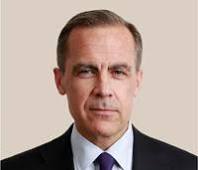 Markets were surprised earlier today by higher than expected British inflation data. The annualized rate came in at 3.1%, slightly higher than the expected 3% which was the consensus forecast, and the highest overall in almost 6 years. That might not sound like much, but there is a reason why it is important: according to British law, the Governor of the Bank of England, Mark Carney, is required to write a public letter to the British Chancellor of the Exchequer (the finance minister) explaining why the rate of inflation is more than 1% over the target of 2% which the Bank of England is mandated to aim for in its monetary policy. This will be an embarrassment to Mr. Carney, popular with the political establishment, but often attacked by pro-Brexit politicians who feel he overstepped his mark by seeming to warn against Brexit before the referendum, and then against a “hard Brexit” during the ongoing legal wangles in the U.K. The letter must be published publicly and will be released in February as part of the Bank of England’s scheduled policy release.
Markets were surprised earlier today by higher than expected British inflation data. The annualized rate came in at 3.1%, slightly higher than the expected 3% which was the consensus forecast, and the highest overall in almost 6 years. That might not sound like much, but there is a reason why it is important: according to British law, the Governor of the Bank of England, Mark Carney, is required to write a public letter to the British Chancellor of the Exchequer (the finance minister) explaining why the rate of inflation is more than 1% over the target of 2% which the Bank of England is mandated to aim for in its monetary policy. This will be an embarrassment to Mr. Carney, popular with the political establishment, but often attacked by pro-Brexit politicians who feel he overstepped his mark by seeming to warn against Brexit before the referendum, and then against a “hard Brexit” during the ongoing legal wangles in the U.K. The letter must be published publicly and will be released in February as part of the Bank of England’s scheduled policy release.
The Bank of England is now in a difficult position. It will have to justify why inflation is so high. It is often overlooked how strange the long-running macro environment is. The Bank of England pays an interest rate of 0.5% on a currency which is depreciating in value by 3.1%, meaning a Pound saved is making an annual loss of 2.6%. This is the largest negative “real interest rate” of any major global economy, suggesting further rate hikes are required urgently. Yet the British economy is growing at only 1.5% year on year, and the pace appears to be slowing. There is some evidence that the pace of foreign investment is slowing as investors fear the possibility of a hard-left government (narrowly avoided in last summer’s general election) and a harder Brexit (the likelihood of which appears to be diminishing). So how will Governor Carney say, diplomatically, that he knows he should raise interest rates, but that even with a punishing negative interest rate of 2.6% on savers, he can’t afford to do so as the economy is fundamentally weak? He can’t blame fear of the Labour Party, so he will have to blame Brexit, even though its probable the former is a bigger brake on investors than the latter.
What does all this mean for the Pound? Well, the Pound is the most volatile of all major currencies and has been for several weeks – but the Forex market is trading with very low levels of volatility anyway. The inflation news has not moved the Pound much, which suggests that market does not believe there is much chance of a further rate hike. Things will get very interesting if the next inflation figures show a still higher annualized inflation rate without a meaningful rise in growth, and then the nightmare scenario of inflation with a flat economy would come a step closer. But there is no good reason to assume that it will, yet.
